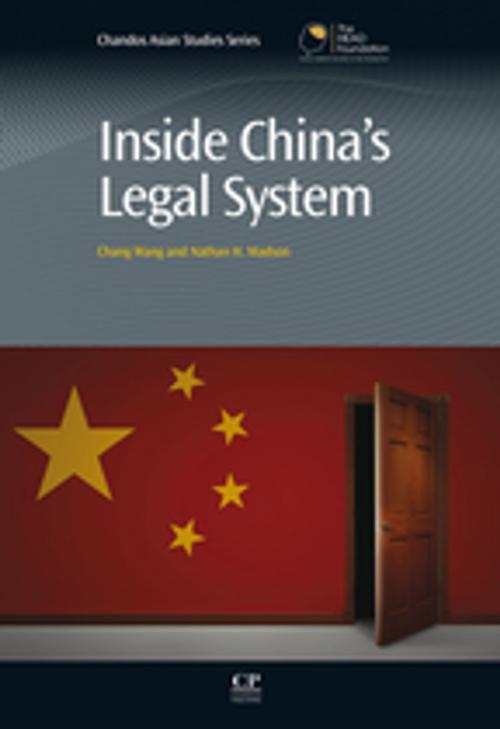| Author: | Chang Wang, Nathan Madson | ISBN: | 9780857094612 |
| Publisher: | Elsevier Science | Publication: | October 31, 2013 |
| Imprint: | Chandos Publishing | Language: | English |
| Author: | Chang Wang, Nathan Madson |
| ISBN: | 9780857094612 |
| Publisher: | Elsevier Science |
| Publication: | October 31, 2013 |
| Imprint: | Chandos Publishing |
| Language: | English |
China’s legal system is vast and complex, and robust scholarship on the subject is difficult to obtain. Inside China’s Legal System provides readers with a comprehensive look at the system including how it works in practice, theoretical and historical underpinnings, and how it might evolve. The first section of the book explains the Communist Party’s utilitarian approach to law: rule by law. The second section discusses Confucian and Legalist views on morality, law and punishment, and the influence such traditional Chinese thinking has on contemporary Chinese law. The third section focuses on the roles of key players (including judges, prosecutors, lawyers, and legal academics) in the Chinese legal system. The fourth section offers Chinese legal case studies in civil, criminal, administrative, and international law. The book concludes with a comparison of China’s fundamental governing and legal principles with those of the United States, in such areas as checks and balances, separation of powers, and due process.
- Uses extensive legal materials and historical documents generally unavailable to Western based academics
- Gives insider knowledge, including first-hand experience teaching law, and close involvement with judges, attorneys, and law professors in China
- Analyses legal issues from historical and cultural perspectives holistically
China’s legal system is vast and complex, and robust scholarship on the subject is difficult to obtain. Inside China’s Legal System provides readers with a comprehensive look at the system including how it works in practice, theoretical and historical underpinnings, and how it might evolve. The first section of the book explains the Communist Party’s utilitarian approach to law: rule by law. The second section discusses Confucian and Legalist views on morality, law and punishment, and the influence such traditional Chinese thinking has on contemporary Chinese law. The third section focuses on the roles of key players (including judges, prosecutors, lawyers, and legal academics) in the Chinese legal system. The fourth section offers Chinese legal case studies in civil, criminal, administrative, and international law. The book concludes with a comparison of China’s fundamental governing and legal principles with those of the United States, in such areas as checks and balances, separation of powers, and due process.
- Uses extensive legal materials and historical documents generally unavailable to Western based academics
- Gives insider knowledge, including first-hand experience teaching law, and close involvement with judges, attorneys, and law professors in China
- Analyses legal issues from historical and cultural perspectives holistically















